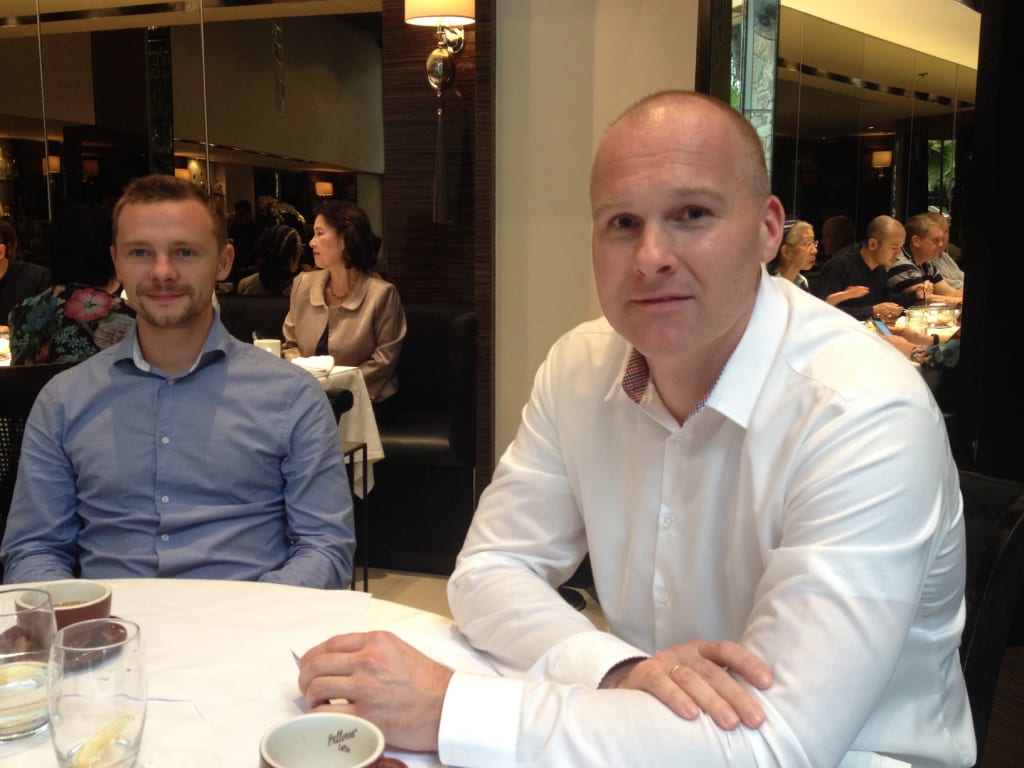
David Minol, who grew up in the Czech Republic, describes the Philippines as a hot country, not only because of its tropical climate but also in terms of its rapidly growing economy.
His company, Home Credit Philippines, is taking advantage of the large Filipino population and their growing penchant for appliances, electronics, mobile devices, computers and other gadgets.
Home Credit Philippines lends to ‘unbanked’ people aiming to buy appliances, electronics or furniture on an installment basis. Two and a half years after it set up its shop in the country, the company lent nearly P2 billion to 200,000 borrowers and recruited 1,700 Filipinos mostly for its salesforce.

“We call it consumer finance, which means we are in financial services, but in retail business. Our customers are in our mind. Our company is a customer-centric organization, focused on the retail,” Minol says in an interview at a restaurant in Makati City.
“Our customers are unbanked. Typically, they do not have the bank account, they do not have access to the traditional banking system. We are the ones that are giving them the first-time experience in financial services. We try to support the financial literacy program here,” he says.
Minol says Home Credit Philippines is a non-banking financial institution, accredited by the Securities and Exchange Commission. “Having the experience from other countries, the application process and obtaining the license from SEC was one of the quickest in the Asian market. We really had very professional experience from the SEC,” he says.
Home Credit, the parent company based in the Czech Republic, infused P2 billion worth of equity capital in the Philippine unit, which has offices in Ortigas and Cubao. Minol, who first arrived in the Philippines in July 2013, now lives in Dasmariñas Village, Makati City, along with his wife and two children. His daughter, the youngest, was born in the country.
“We operate in mostly emerging markets. First, typically a significant proportion of the population is unbanked. There is a strong demand for financial services by the middle and lower-middle class.
This is actually the spot, and the market segment that we are looking at. We are serving the people who are not served by traditional banking organizations,” says Minol.
“If they go to the shop of SM Appliances, Automatic Centre and other big retailers, instead of paying cash or using the credit card, they can buy the goods and enjoy an affordable installment plan from Home Credit. This is our operation. We have our own people in the shop. We help customers in application process, within 30 minutes. It is really easy, simple and fast procedure for the customer to get a loan, and he can leave the shop already with the electronic or mobile phone for example in his hand. That is our value proposition,” he says.
Minol says borrowers prefer to pay in installment because they want to keep their cash. “We recently ran some marketing research about that. It is really about the available cash. For some of the customers, they prefer to keep their cash for other purposes. They would rather pay the downpayment, and pay in installment. For some of them, it is about upgrade. Instead of buying cheap feature phones, they prefer smartphones, with Internet functions, that they can use to find jobs. So they would use the money for the downpayment or upgrade … We can really see a rich demand from mass and sub-mass population for installment financing,” he says.
The company, encouraged by the rapid pace of growth in the Philippines, now plans to introduce more financial products and even apply for a quasi-banking license with Bangko Sentral ng Pilipinas.
Minol says the mass market comprises Home Credit’s customers. “It is the people who have income, either employed or self-employed or recipients of remittances from abroad, and who typically do not have credit cards,” he says.
He says Home Credit also teaches financial literacy among customers. While customers ventilate their grievances in the Internet over the alleged aggressive collection tactics by Home Credit collectors, Minol says it is important for the company to exercise risk management.
“That is the cornerstone of our business. We manage the risk to make it a value proposition for the client,” he says.
Home Credit provided its first loan in the Philippines in October 2013, making the country its youngest market in Asia. It provides loans ranging from P2,000 to P60,000, with an average size of P8,000. Average tenor is 12 months, although it could range from six months to 18 months, depending on the commodity and the preference of customers.
“We are growing. We already have 200,000 customers. Our average loan is P8,000. If you do the calculation, we will be already lending P2 billion in the first two and a half years of operation. We have invested significantly in the technology and the people. We are looking for profitability in the coming years,” he says.
Minol, a chartered certified accountant and who has a Master’s degree in finance from the University of Economics, Prague, has worked with Home Credit since 2006, acting as deputy to the CEO and later chief financial officer for Home Credit China. He served as chief financial officer for Asia from 2011 to 2013, before he was tapped to form the Philippine unit in July 2013.
Borrowers can apply for in-store financing to purchase consumer durable goods by presenting at least two valid IDs, completing an application form and paying the downpayment. Applications are processed within 30 minutes, says Minol.
Minol says Home Credit is now present in nearly 1,000 stores nationwide. Among its merchant partners are Acer, Automatic Centre, Lenovo, Memo Xpress, MyPhone, Oppo, Samsung, Silicon Valley, SM Appliance and Robinsons Appliances.
“Our people are physically present in those shops. If you go to the Automatic Centre, for example, you can see Home Credit employees wearing the red uniform. You can immediately apply for a loan from Home Credit. Instead of paying cash, you will get the gadget and pay in installment,” he says.
Monthly installments are settled at BDO, RCBC, Malayan Bank, SM Stores, Bayad Center, LBC, Villarica Pawnshop, Prime Asia Pawnshop, Cebuana Lhuillier, 7-Eleven and various payments centers.
The company is on an expansion mode and began operating outside Metro Manila, including Cavite, Pampanga, Cebu and recently Isabela.
Home Credit started in 1997 in a village near Brno, the second biggest city in the Czech Republic. Its parent company is PPF (První privatizační fond), which is owned by billionaire Petr Kellner, the richest person in the Czech Republic. “Having a strong leadership and capital for expansion, he is one of the elements behind the Home Credit expansion as well,” Minol says.
“After a couple of years, we expanded to Russia. It is still one of the biggest markets for us. Then we went to ex-Soviet Union countries. We have business for years already in Kazakhstan, Belarus and in 2006, we started operating in Asia. It is the first wave of Asian expansion, which had China and Vietnam,” he says.
“I went in 2006 to China. Three or four years ago, we started looking at other opportunities in Asia. So we opened in India, Indonesia and the Philippines. So the Philippines is the youngest market. Now, the last country that we are going to open in is the US. We have already signed a joint venture agreement. We will be opening our US operation in a month’s time,” he says.
“We can see that the business is strictly diversified. It is in Europe, Russia, Asia and now the US. We are finally becoming a global company. We started in Czech Republic 20 years ago,” Minol says.
On what makes Home Credit different, Minol says “the essence of the business is risk management.”
“We believe that over the years, we have developed a unique know-how for the emerging market. If you look at most of our countries, they are emerging countries. We develop a set of procedures and train the people on how we do the risk management,” he says.
Minol says Home Credit now has a significant operation in terms of the number of people. “Here in the Philippines today, we have 1,700 employees, which is after two and a half years of operation. That is a significant number. We keep hiring 100 to 200 people every month. In the horizon of next two to three years, we should be aiming at 5,000 people. Majority of the employees are in the sales force,” he says.
Home Credit has emerged as the biggest employer among Czech companies in the Philippines. “In April, we will be opening our 1,000th shop. Today, that number is 960 something, so we will have 1,000 shops operating. And we will keep growing. We still see the potential, as the customer demand is much bigger than 1,000 shops. So we will continue with the expansion to bring our services to the broader population,” says Minol.
“As of today, we have 200,000 customers. It is really the beginning. We have to be careful. We are looking for a significant number in terms of customers,” he says.
Minol says the Philippines is an interesting market, because it has a long history of consumer finance that began in the 1960s.
He says interest rates on Home Credit products range from 4 percent to 5 percent, depending on the commodity and maturity of the loan. “We now have selective producers and retailers with zero interest campaign, where customers do not pay any interest. We also have this campaign that if you pay all the installment on time, the last month is a gift from us. Instead of paying the 12th month installment, and you paid all the 11 months on time, the 12th month is for you and it is a gift. So it is a combination of different products. On average, I would say the interest is about 4 percent to 5 percent, monthly,” he says.
Minol says Home Credit is in the Philippines for the long term, with a target to have 1 million customers in the coming years. “We don’t do this business for the short term. It is for the long term. The point here is to be in the Philippines basically forever. That’s why we don’t like the short cut. We want to build the business from the beginning,” he says.

